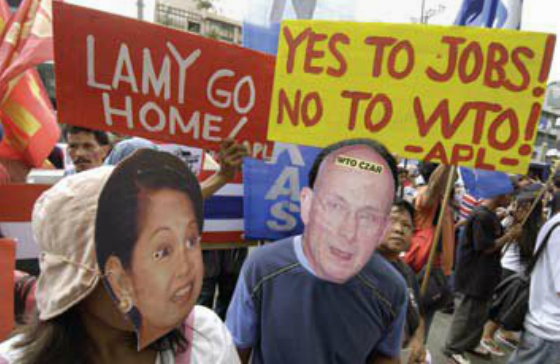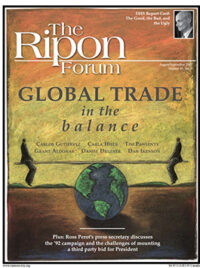It is do or die for the Doha round of World Trade Organization (WTO) trade talks. It may well be do or die for the global economy, too. It depends on the ability of politicians in both the developed and developing world to understand how fundamentally the world economy has changed and how they must use the Doha negotiations as a vehicle for articulating trade rules that match those changes.
If the trading system survives, it will do so either because of vigorous farsighted leadership or in spite of it. Based on the track record thus far, the latter looks like the far more likely, if less welcome and considerably more risky, outcome. The record of recurring failure to date puts even that result in doubt.

The current round of multilateral trade negotiations, launched by the members of the WTO in Qatar in 2001, have dragged on for nearly six years without even defining the modalities that would govern the talks and define the shape of the deal. The negotiators have yet to begin the actual bargaining over specific trade barriers that will be required to complete the round. In significant areas, such as trade in services, the negotiators cannot even see the outlines of a bargain they could strike.
The Doha Development Agenda, as the round is known, has foundered over two obstacles – developed countries’ agricultural subsidies and developing countries’ tariffs. On the agricultural front, politicians in the United States and Europe defend their agricultural policies and face a serious backlash from farmers, even as the United States prepares to legislate a new farm bill and the European Union (EU) looks toward another round of reform of the Common Agricultural Policy (CAP). Japan hopes to exclude rice from the negotiations. Canada, as one Canadian negotiator remarked to me, is saved from its own hypocrisy on farm trade only by the intransigence of the U.S. and EU.
In the developing world, the putative leaders of the group, India and Brazil, have indicated that they do not intend to cut the actual tariff rates they apply on either farm products or industrial goods, preferring to lower only their “bound” rates (i.e., the levels at which they previously agreed to limit their tariffs). Their stance is all the more remarkable because their unilateral cuts in tariffs, in India in particular, have spurred significant economic growth and productivity gains, leaving their current tariff levels far below the bound rates.
The irony is that both obstacles reflect the trade politics, domestic and international, that prevailed 30 years ago, not the economic challenges we face in today’s global economy behind the changes in the world economy. Indeed, any trade negotiator active in the Tokyo Round of talks under the General Agreement on Tariffs and Trade (GATT), which ended in 1979, would recognize the trade measures – subsidies and tariffs – that separate the two sides.
Rich country agricultural subsidies have dogged the trading system since its creation. In 1947, at the outset of negotiations that would eventually become the GATT, the United States tabled a draft agreement that imposed significant disciplines on industrial goods (where the U.S. has a strong comparative advantage, particularly in the post-World War II era). The draft was considerably weaker on agriculture, where the developing countries of the day had a stronger comparative advantage.
…trade is ultimately, about domestic politics, not international bargaining. It is about creating the political space domestically so that a deal can be struck globally.
Even those weak disciplines eventually proved too much for the United States, which demanded a waiver for all of its agricultural programs in 1955. That waiver, which essentially eviscerated any meaningful rules on farm trade, would come back to haunt U.S. farmers when it was used as precedent by the EU’s predecessor, the European Economic Community, to provide cover for its larger and more trade-distorting CAP program.
A similar sorry saga traces developing country trade policies. Rather than bargaining for stronger disciplines on agriculture at the outset of the GATT, they asked to be relieved of the stricter disciplines on trade in industrial goods.
Their logic followed the intellectual trends of the time, both with respect to the benefits of socialism and with respect to trade theories that suggested high import barriers would encourage economic development because they would force adjustment from subsistence agriculture toward higher valued-added manufacturing. The fact that neither state domination of the commanding heights of the economy nor import substitution actually worked does not appear to have affected developing country trade policies based on their bargaining positions in the current round.
In the interim, however, both the global economy and the domestic economies of rich and poor alike have changed fundamentally. Agriculture now makes up less than 2 percent of the U.S. economy. The same holds true in Europe and Japan. The U.S. economy is nearly 85 percent services, such as telecommunications, financial products, logistics, and marketing.
Developing countries are no longer in the back of the pack economically by many measures. As a group, developing countries now make up more than 50 percent of the world’s gross domestic product and considerably more than 50 percent of the world’s economic growth. Significantly, China and India contribute only a quarter of the growth coming out of the developing world, testifying to the broad nature of positive economic changes under way in many poorer countries.
International trade has changed as well. Whereas trade prior to the Tokyo Round in the 1970s largely involved arm’s length transactions between independent exporters and importers, trade today is largely within the supply chains of globally-engaged firms with operations in many different regions of the world. For those actually engaged in international trade, the goal today is not to export to Japan or to the United States as much as it is to export to Toyota or Wal-Mart and let them take you global.
In the process, the changes in the world economy long ago outpaced the concepts underlying the current trading system and the Doha round of negotiations. That is why the negotiators have driven into a cul-de-sac. It is not simply intransigence on the part of U.S. and EU negotiators on agriculture or willful disregard of their economic interests by the Indian and Brazilian negotiators.
To understand that conundrum, it helps to know how bargains are reached in the WTO. Negotiators start from a very mercantilist perspective (a major curse in the world of trade). They bargain for market access for their exports and try to limit the import competition their industries face. A winning deal politically is one in which they gain considerable market access and offer none. You can see the difficulty of reaching a deal on that basis.
But the far more important point is that none of that makes sense in a global age. In a global economy, the competition is not for markets, but for capital, talent and ideas. In that context, what matters most is a country’s openness to globally-engaged firms that bring investment, technology, knowhow, and experience in world trade. They may be domestic or foreign, but what matters most is their attraction towards those nations that are open to the world.
Given the reality of both current politics and the global economy, it is not hard to see why public support for free trade and open engagement in the world economy has fallen precipitously. Nor is it hard to understand why politics in the United States, Europe, Brazil and India, along with a host of other countries, has taken on a far more populist and protectionist tinge of late.
It is hard for voters to put their trust in political leadership that seems to lack even a basic acquaintance with the world economically, much less a sense of how the broad global trends affect the individual consumer or worker’s pocketbook. That simple fact transcends all the intricacies of the negotiations, because trade is ultimately about domestic politics, not international bargaining. It is about creating the political space domestically so that a deal can be struck globally.
Thus, while the subject matter is economic, the challenge is ultimately political. The challenge for George Bush, Angela Merkel, Manmohan Singh or Lula is to articulate a clear vision of how a Doha deal fits within a global economy of broadly-shared benefits. That is the only way to galvanize the political support for a deal that is “do,” not “die.”
Grant Aldonas served as the U.S. Under Secretary of Commerce for International Trade from 2001- 2005. Currently, he is the Principal Managing Director of Split Rock International, an international consulting and investment firm.




